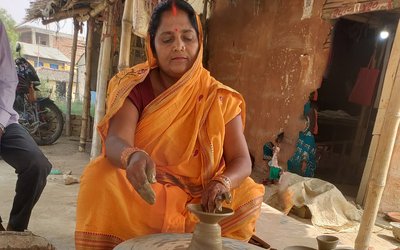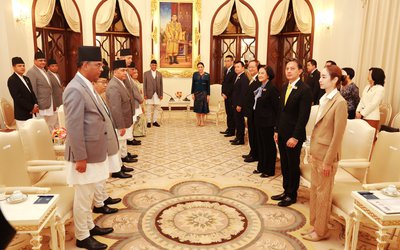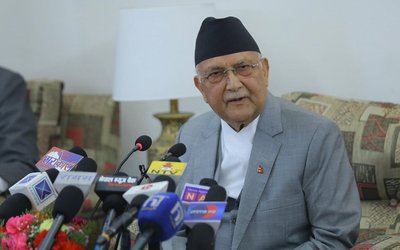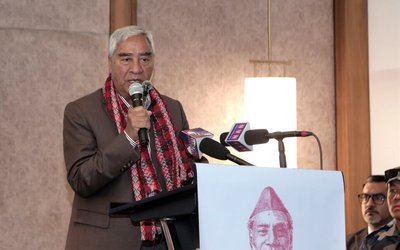
Having long experiences of dealing in Nepal, ASKO LUKKAINEN, a first resident ambassador of Finland to Nepal, has been observing Nepal's ongoing political development closely. Along with development program, development and governance issues, Finland also is also providing support to coming elections. At a time when there is growing uncertainty over the elections, NEW SPOTLIGHT spoke to Finland's ambassador to Nepal LUKKAINEN on various issues: Excerpts:
As Nepal comes close to holding the elections of Constituent Assembly, how do you observe the overall scenario in Nepal?
I was just attending a meeting organized by the Election Commission, which was informing the Heads of the Foreign Missions about the status of the preparations for the CA elections. The Commission seems to be in full swing and I got the impression that the preparations have advanced well. The alarming issue is the coalition of CPN (Maoist) + 33 parties which still have not been registered to the elections. Hopefully the coalition will do so. I am also very alarmed by the coalitions plan, in case it will not attend the elections, to disrupt the elections by any means. This is against the Election Code of Conduct and the fundamental right of every voter to elect their representatives. Those who plan the disruption do also despise the democratic values. Organizing bandhas related to elections is in the same category in my opinion.
In the past, Finland has been supporting Nepal's elections process, how are you supporting the elections this time?
As soon as the election date was announced Finland disbursed 2.5 million Euros into the account of the Nepal Peace Trust Fund which will channel the money to the needs of the Election Commission. In rupees this amount is equivalent to 350 million rupees. So we are, as so many other countries, heavily involved in the election financing. I am really happy and proud that we are part of the process.
Given Nepal's past experiences, political parties repeatedly change the elections date. If they change the date this time, what would be the response of Nepal's democratic friends from west particularly west?
At the moment Nepal has not an elected parliament, not an elected Constituent Assembly and not locally elected bodies. So, one can argue that the state of democracy is weak if not existing in Nepal right now. This is why a huge majority of Nepali people want to have the CA elections in November. Changing the date, November 19, would not give any benefits to the country. The West and probably also the North and the South would certainly be disappointed and it is possible that the postponement of the CA elections would have economical consequences too. We all want to support democratic Nepal and if there are no elections at least some countries which support Nepal have to reconsider their future plans regarding this country. It is very difficult for instance to convince our headquarters that we should increase our support to Nepal if the present situation prevails.
As Nepal does not have local elections for last 16 years, how it is affecting development projects supported by Nepal's development partners like Finland?
Since Finland´s assistance to Nepal is directed to the poorest people we are active especially in rural areas. When the elected local bodies are not in place all the planning and implementation of our projects is discussed with the civil servants, not with the representatives who have the mandate of the people. I have nothing against the civil servants, I myself am one of them, but this situation is not democratic and can lead to decisions which do not benefit the people in rural areas in a maximal way.
Don't you think Nepal needs to have local elections?
Obviously my opinion is yes, local elections are needed soonest. My priority order is CA elections in November, local elections in 2014.
At a time when Nepal's overall development process highly depends on foreign aid, Nepal government is saying that it wants to change the Foreign Aid Policy. How do you look at it?
It is good that Nepal wants to have Foreign Aid Policy since this shows that the Government wants to be in driver's seat in the development of the country. I welcome this initiative and hope that the new policy will emphasize Nepal´s Government´s leadership in aid coordination. But I also like to emphasize that the new Foreign Aid Policy should be discussed with the donor community before its approval. Our comments should be considered in case there are some.
Due to delay in the formation of Disappearance and Truth and Reconciliation commission, many incidents related to conflict periods are coming up. How do you look at it?
I understand that the content of these bills is under discussion. My firm opinion is that the content should be in line with the international standards. As long as the bills are not approved new cases will most probably come up.
What is your reaction for delaying implementation of transitional justice system to look the incidents related to rights violations?
The victims and their relatives and in some cases the perpetrators also would like to see the transitional justice system in function since the waiting is painful. Only after cases have been thoroughly discussed and agreed those who have been involved can get the peace into their minds. So the situation is difficult right now. I understand the extreme complexity of the situation and hope that the Government finds an acceptable way out of it.
How will be reactions of Nepal's development partners in case of failure to hold the elections in November 19?
I believe I already gave an answer to this question by answering your question number 3. But let me use this opportunity to extend my best wishes to the people of Nepal. Times during the civil war and during the political turmoil after that have been difficult and hopefully the most difficult period is over now. I put my hope into the CA elections in November and elections of the local bodies after them.
What is your impression about Nepal?
As you know I have been serving in Nepal 2000-2004 and now again since September 2011. During all these years I have learned to know many Nepali friends and what seems to be common with them is the desire for stable democratic political situation in the country which would enable the investments here which again would lead to the increase of the jobs available. I am sure that the politicians in the country are aware of the opinion of the people and will join their hands in order to make this country a prosperous one. This is what the people really want.
- IME GROUP: Expands Into Paper Industry
- Mar 24, 2025
- CPN UML: Instigated By India
- Mar 23, 2025
- ADB’S CHIEF ECONOMIST: Nepal Reduces Poverty
- Mar 11, 2025
- FM DR. DEUBA: A Successful Visit
- Mar 11, 2025
- MD GHISING: Target Of Personal Grudge
- Mar 09, 2025















